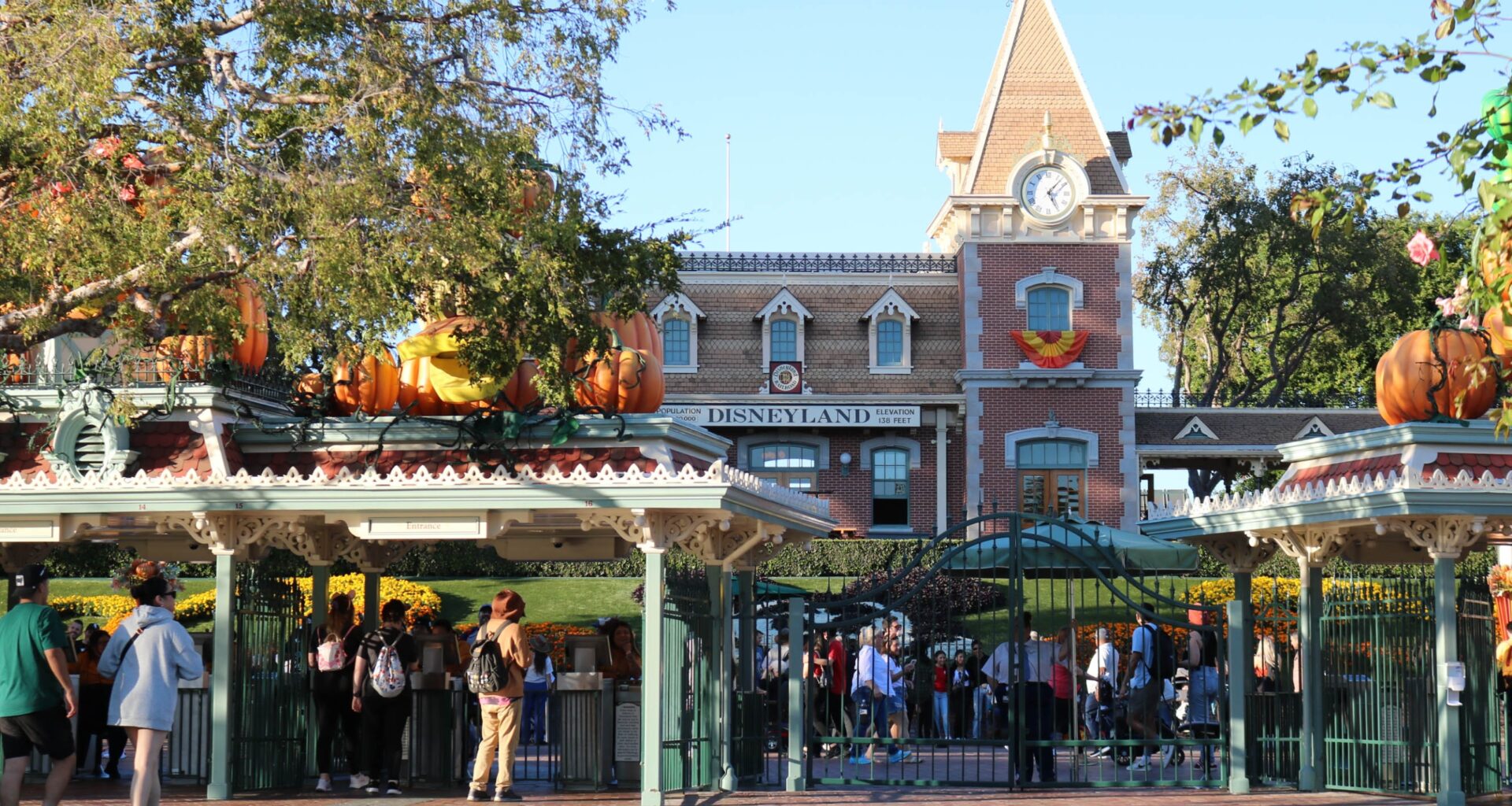Anaheim voters are unlikely to decide whether Disneyland customers should pay a 3% admission tax to help patch a public budget that city staff predict could be in a deficit by the end of the decade.
City Councilwoman Natalie Rubalcava, whose 2022 campaign was heavily backed by Disney, is spearheading efforts to ask voters if they want to roll out a gate ticket tax on large venues like Disneyland – along with a parking lot tax.
“It really is my responsibility to ensure we have a properly funded general fund for the residents of Anaheim including the people who work for our city,” Rubalcava said at Tuesday’s council meeting.
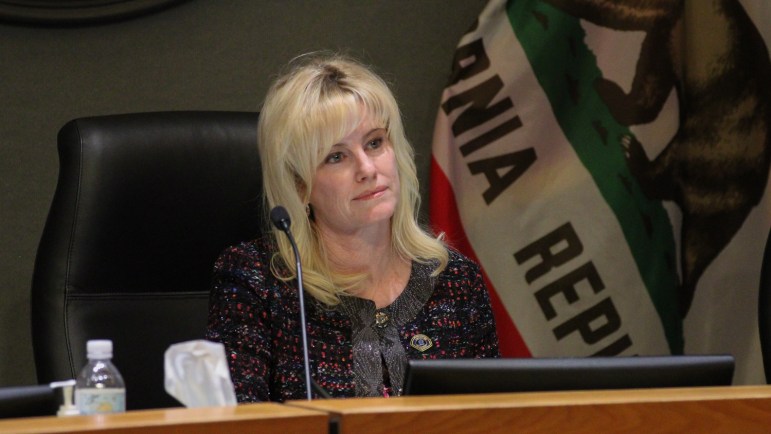 Anaheim Mayor Ashleigh Aitken on April 16, 2024. Credit: ERIKA TAYLOR, Voice of OC
Anaheim Mayor Ashleigh Aitken on April 16, 2024. Credit: ERIKA TAYLOR, Voice of OC
Mayor Ashleigh Aitken said the proposal targets Disney after they just approved the Disneyland Forward theme park expansion last year, which is expected to bring in nearly $2 billion in investments to Anaheim over the next decade.
She also said the city needs to diversify its revenue.
“I just keep thinking about something my grandmother used to always say – pigs get fat and hogs get slaughtered,” Aitken said at Tuesday’s meeting. “We can keep trying to work with our partners and work with our resort community and work with our business leaders to attract more investment or we can bleed them dry.”
Rubalcava said residents are being short changed.
“The hogs have not been slaughtered. They continue to thrive in our city except for the residents,” she responded.
It comes after city officials grappled with a $60 million budget deficit earlier this year – closing the gap through a mix of bonds and one-time spending.
[Read: Will Anaheim Tax Disneyland to Keep the Public Budget Afloat?]
While a majority of her colleagues didn’t support the gate tax proposal, they voted 5-2 to bring back other revenue generating ideas at an undetermined later date including information from the gate tax proposal.
Aitken and Disney-backed Councilman Ryan Balius voted against the move.
Opposition to the gate tax marked the first major split on the current city council.
Rubalcava pushed back against her colleagues throughout Tuesday’s debate, arguing the tax would bolster and diversify their revenue and wasn’t intended to harm Disney like previous gate tax proposals.
“It’s really hard for me to understand the argument that this would deter development or hurt business when it’s really not a negative impact on their bottom line – a traveler coming here and spending $4,” she said.
“They are focused on making sure their shareholders are taken care of and our most important shareholders are the residents of Anaheim.”
City staff estimate the 3% gate tax combined with a 10% parking tax could produce up to $164 million annually for local coffers.
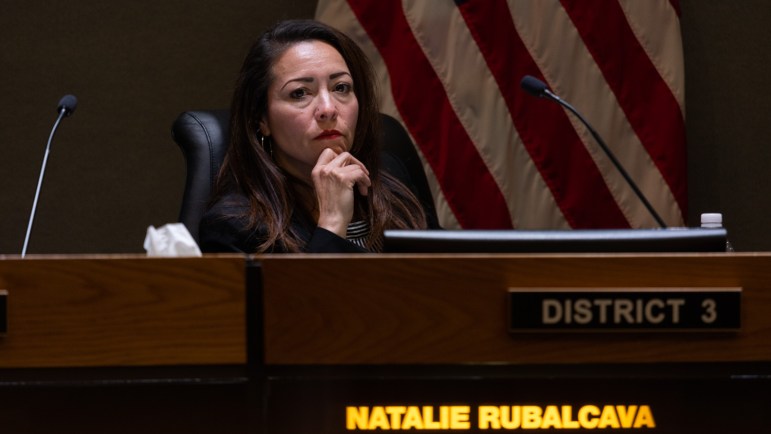 Councilwoman Natalie Rubalcava during the Aug. 15, 2023 City Council meeting. Credit: JULIE LEOPO, Voice of OC
Councilwoman Natalie Rubalcava during the Aug. 15, 2023 City Council meeting. Credit: JULIE LEOPO, Voice of OC
The Walt Disney Co. did not respond to a request for comment on the issue last week. They’ve previously opposed such a tax.
It’s a proposal previous city council members have long rejected in a town where Disney is the biggest spender on local elections.
Tuesday’s gate tax debate also comes a couple years after FBI agents and independent investigators separately concluded Disneyland resort interests hold undue influence over city hall.
[Read: Anaheim’s Own Look at City Hall Finds Disneyland Resort Businesses Improperly Steer Policymaking]
Councilwoman Natalie Meeks, whose 2022 campaign was heavily backed by Disney, said the resort district is already contributing significantly to Anaheim’s budget.
“They’re paying their fair share, and now we’re suggesting punishing them for that, and saying, ‘no, you need to pay more because we need money over here for other things that you have nothing to do with,’” she said at Tuesday’s meeting.
“That just philosophically doesn’t feel right to me,” Meeks said, adding that city officials should focus on growing existing revenue like hotel stays and sales tax.
Currently, over $246 million or 39% of the city’s general fund revenue comes from the city’s hotel bed tax. The resort area accounts for about 97% of the hotel tax revenue generated in Anaheim, according to city staff.
City council members are expecting about $120 million in tax money to be freed up in a couple years when the city pays off the bonds from the 1997 Disneyland expansion.
About roughly half that money will go towards covering the city’s projected budget deficit, while $65 million could be used towards a public pool or aquatic center, addressing deferred maintenance, a new senior or community center, 10 more police officers and a fire station, according to a city staff report.
City staff said while the freed up bond revenue will cover the structural budget deficit, there is a possibility that the city could face a $1 million deficit at the end of the decade, depending on labor agreements.
Councilman Carlos Leon said the resort area is a lifeline to Anaheim and city officials need to come up with a plan for the freed up revenue.
Councilwoman Kristen Maahs, whose 2024 campaign was heavily supported by Disney, said officials should focus on diversifying their revenue streams and worried that the entertainment juggernaut would spend money on their other theme parks.
“We have the best park in the world and Disney’s best asset but the reality is that they do have other places where they could invest,” she said at Tuesday’s meeting.
“As a business, I expect they will make decisions in the best interest of their shareholders.”
Rubalcava said Disney wasn’t going anywhere.
“The fact that we’ve all come here and talked about how it would hurt business, or even fathom the fact that Disney could possibly pick up and move away is ridiculous,” she said.
“We know they’re not moving to Arizona. We know they’re not going to limit development and I’m just saying that we need to do the right thing for the residents of Anaheim.”
Who Could Get Taxed?
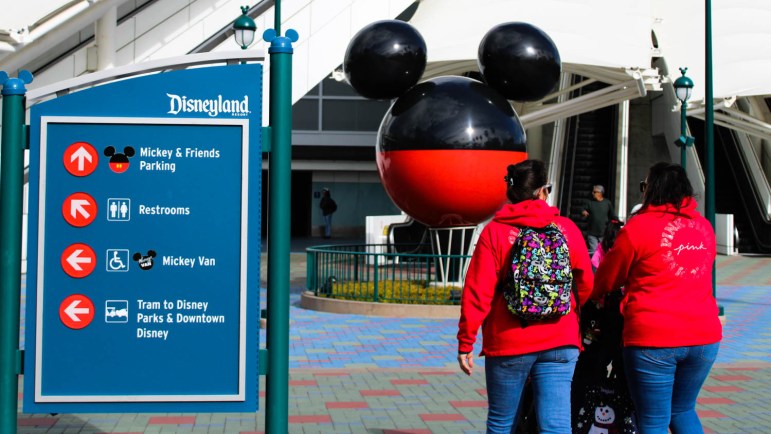 The Mickey and Friends parking structure at Disneyland is bustling with visitors for the holiday season on Monday Dec. 5, 2022. Photo Credit: AVA MCLEAN
The Mickey and Friends parking structure at Disneyland is bustling with visitors for the holiday season on Monday Dec. 5, 2022. Photo Credit: AVA MCLEAN
City officials estimated a 3% admission tax on Disneyland and other large venues with a capacity of more than 20,000 people could generate between $89 million to $134 million annually for Anaheim, according to a staff report.
They also estimated a 10% parking tax on privately owned or operated garages and lots with over 1,500 spaces could generate $19 million to $30 million for the city annually, according to the same report.
The proposed taxes would apply to Disney’s two theme parks.
According to the staff report, the tax would also apply to Angel Stadium.
But there’s a catch.
Due to a lease agreement – scrutinized earlier this year by state auditors – the ball club could be entitled to a reimbursement for the money collected.
The Honda Center and the OC Vibe! project do not meet the 20,000 people capacity threshold.
Sounding Off on a Gate Tax
A host of members of the Anaheim Police Association supported the proposed measure, arguing the department is understaffed by 70 officers and saying that resources are pulled from other parts of the city when major incidents happen in the resort area.
They also said that the city supported Disneyland’s expansion 30 years ago on the promise that the taxes generated would fund world class city services but the company has not lived up to their end of the bargain.
Jose Duran, president of the association, said investing in public safety is paramount to Anaheim’s tourist economy – one that puts strains on essential services like police.
“Millions of visitors come to Anaheim every single day that drain – but don’t contribute to – those essential city services,” he said at Tuesday’s meeting.
“Anaheim is built on dreams and opportunity, but that shouldn’t be limited to what happens at bigger businesses across our city and our neighborhoods deserve to thrive as well. We need cleaner parks, safer roads, stronger neighborhoods and more police officers.”
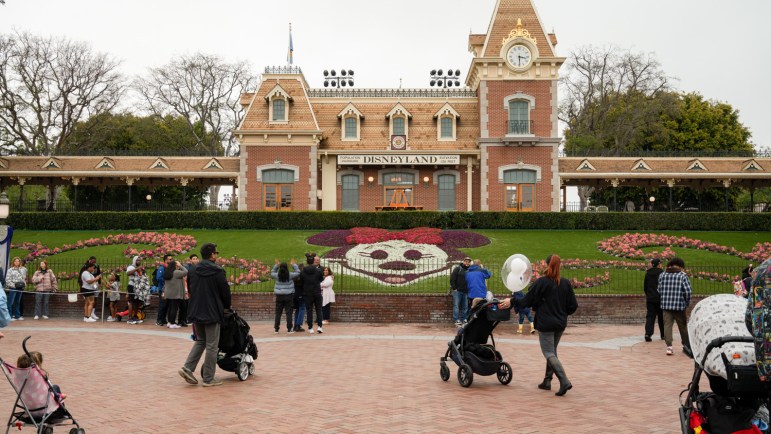 People walk and take pictures at the entrance of Disneyland Park in Anaheim on Mar. 16, 2023. Credit: GIL BOTHWELL, Voice of OC
People walk and take pictures at the entrance of Disneyland Park in Anaheim on Mar. 16, 2023. Credit: GIL BOTHWELL, Voice of OC
Hoteliers as well as a representative from the state’s attractions and parks association said the proposed tax would drive away tourists and in turn decrease the amount of hotel tax revenue generated in Anaheim and devastate the city’s “economic engine.”
“The proposed measure is shortsighted and risks crippling decades of future economic growth for the entire city,” said Sabrina Lockhart, executive director of California Attractions and Parks Association.
“Raising the cost of visiting Anaheim makes other destinations like Arizona and Florida and Nevada financially attractive. While other States actively incentivize tourism and see brand new park expansions, a targeted entertainment tax here puts California at a competitive disadvantage,” Lockhart said.
Meanwhile, Disneyland executives announced this Fall they would be raising their prices for most daily tickets and some annual passes.
Ivon Peña, interim co-executive director of Orange County Communities Organized for Responsible Development, said the proposed measure is about reinvesting in the community and being fair to residents.
“Every day, our communities feel the strain of a city budget stretched thin. Parks go unrepaired. Housing becomes less affordable and youth programs disappear,” she said.
“All while, billion dollar entertainment corporations like Disneyland, the Honda Center and Angel Stadium benefit from city resources without paying an admission or parking tax and continue to raise prices.”
Peña added money generated from the proposed tax should go towards affordable housing, parks and libraries and not “expand already oversized police budgets.”
Over $213 million of the city’s nearly $530 million general fund goes towards the police department, according to the city’s budget.
Amanda Walsh, vice president of Government Affairs for the OC Business Council, said that $4 could make the difference for some families debating whether to vacation in Anaheim or not.
She also said the resort district supports thousands of jobs in the city and jeopardizes the success of the city’s tourism based economy.
“Let’s call this what it is. This is a targeted tax singling out special industries to fill the gaps. Anaheim has been a long success because of the strong partnerships between the city and the business community,” Walsh said at Tuesday’s meeting.
“These proposals move in the opposite direction, discouraging investment and putting at risk the very jobs that make Anaheim thrive.”
Rubalcava, OC Business Council’s chief operating officer before getting elected to the city council, refuted such criticisms and said businesses have increased their prices, but don’t get industry pushback.
“I do wonder if some of the trade groups that came here tonight to mention the impact that we would have by increasing or putting a tax on some of these tickets. I do wonder if you reach out to some of these businesses who raise their prices and also oppose their implementation of an increase because it might have a negative direct impact on your business,” she said.
“I’m pretty sure that doesn’t happen.”
Editor’s note: Ashleigh Aitken’s father, Wylie Aitken, chairs Voice of OC’s board of directors.
Hosam Elattar is a Voice of OC reporter. Contact him at helattar@voiceofoc.org or on Twitter @ElattarHosam.
Related

